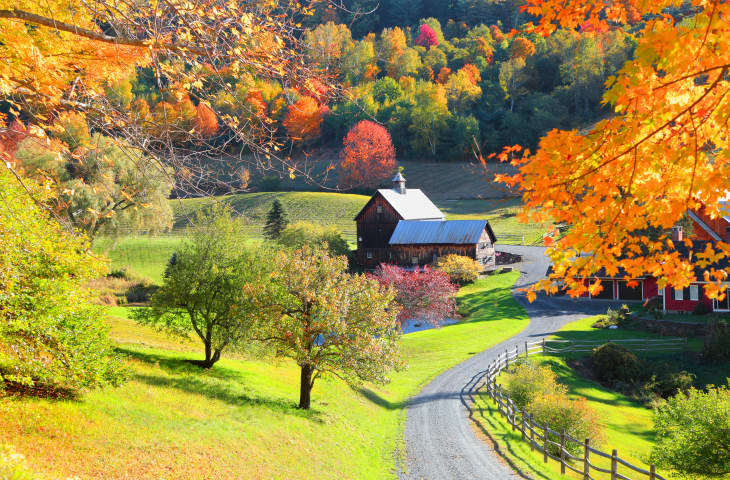5 Things Nobody Tells You About Buying a House in Leaf-Peeping Country

There’s nothing quite like New England in the fall — the delightful crackling of crisp leaves under your feet, the fiery glow of foliage as you drive down a country road. But as anyone who owns a home in prime leaf-peeping territory will tell you, there’s a whole lot more that comes with it. Here are some of the details about buying a home in leaf-peeping country that you may not know about.
Traffic increases in the fall.
“Leaf peepers mean leaf peepin’ traffic,” says Elizabeth Good, who purchased a house in New Hampshire’s Upper Valley back in May. “It’s like Sunday driving to the nth degree. If you are trying to get anywhere, just don’t.” She also notes this means more foot traffic at your favorite local spots, which is a great benefit for local businesses. Just keep in mind it may create delays. “Be prepared to wait a little longer and tip a little more!” she shares.
Competition is still fierce.
If you think it’s going to be easier to find a home just because you’re in a rural area, you’re in for a rude awakening. “People who are going for the big, expensive houses are still paying way over asking, and for those paying under $400,000, there’s a lot of competition,” says Sandra Dell, a real estate agent with The Masiello Group in New Hampshire and Vermont. While she notes that they are getting a few more listings than earlier in the year, there’s still a significant housing shortage. “Once COVID hit, a lot of people from New York and Boston decided they didn’t want to be in the city anymore and came up here to work remotely,” she adds. “It’s still a difficult market to buy up here.”
There are three other seasons.
Yes, New England autumns are stunning. But keep in mind that you’re also going to own this property for the rest of the year. “You want a place that has more than just one season going for it,” says Stephanie Geis, who purchased a cottage on a lake in midcoast Maine in October 2021. Towns in her area, like Damariscotta, are particularly booming in the fall months with events like Pumpkinfest & Regatta. But things get a bit quieter after that. “I think you want to find a place that has something going for it during the other seasons of the year as well, whether it be skiing, hiking, ocean beaches, lakes, or whatever,” says Geis.
Foliage creates yard work.
The sight of burnt orange leaves cascading down from the trees is exquisite. But… you have to clean them up if they land on your property. Owning a home with lots of land means a constant barrage of yard work. “I have been truly astonished to learn how much work fallen leaves are,” says Good, who is used to city life. She suggests finding a great local landscaper to help with yard work while you “build up an arsenal of yard tools.” Local Facebook groups are a worthwhile spot to cruise for recommendations.
If you want pretty leaves, you’ll also deal with snow.
If you’re buying in New England, you need to be prepared for the winter. Dell says her greatest piece of advice for prospective buyers in New Hampshire and Vermont is to have snow tires and an all-wheel-drive car. “People say ‘Oh I have great all-season tires,’ Well, that’s wonderful if you live near town where everything is flat,” says Dell. She also recommends that anyone who doesn’t plan on spending the entire winter in their new home invest in an alarm system that notifies them when the house’s temperature goes under 45 or 50 degrees. This will allow them to send someone to check in on things before the pipes freeze.